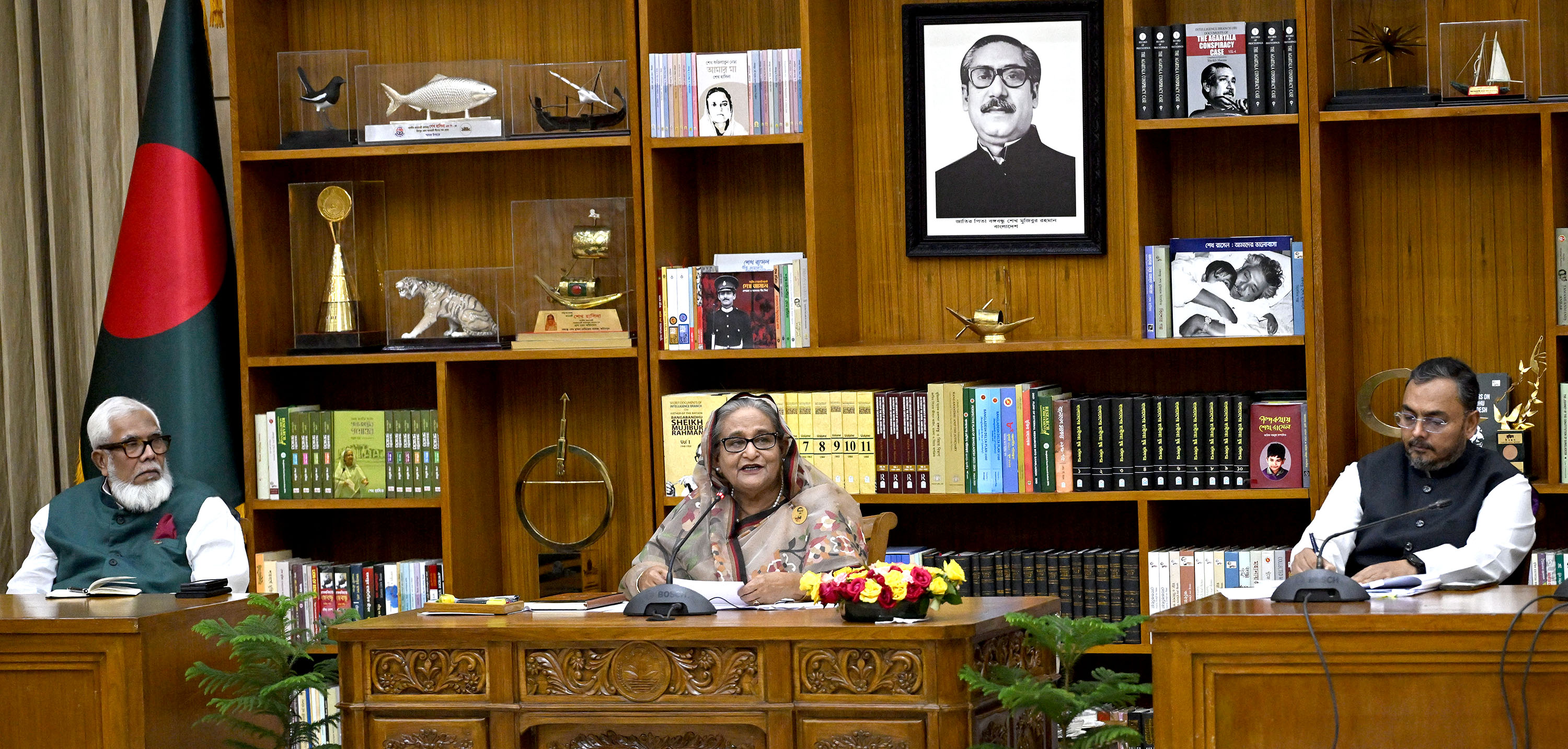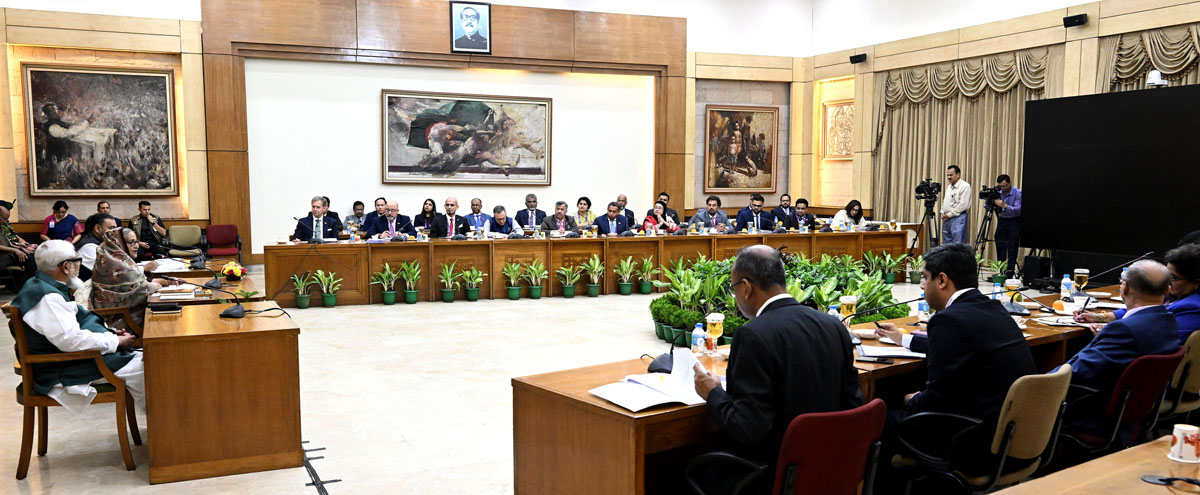
DHAKA, May 27, 2024 (BSS) - Prime Minister Sheikh Hasina today sought support of the United States (US) businessmen in Bangladesh's journey to become a developed and smart country by 2041.
"I call on you to remain with us as partners in our journey to a developed, prosperous, and smart Bangladesh by 2041," she said while addressing a US-Bangladesh Business Council delegation at her official Ganabhaban residence here this morning.
"We aspire to become a "Smart Nation" by 2041. Here, we need your support in increasing our global competitiveness and expanding our export base," she said.
The prime minister said Bangladesh will be graduating from a "least developed" to a "developing" country in 2026.
She said they are determined to achieve the Father of the Nation Bangabandhu Sheikh Mujib's dream as their efforts have led to Bangladesh's remarkable socio-economic growth over the last 15 years.
"Now Bangladesh is globally acknowledged as a "Role Model of Socio-Economic Development," she said.
This has also been possible due to good governance, rule of law, and stability; investment in the rural economy; empowerment of women; and ICT, which led to "Digital Bangladesh, she added.
Sheikh Hasina mentioned that the US has been a major economic and development partner for Bangladesh for decades.
Both countries have intensive engagements in many areas, particularly trade and investment, she said.
"Our shared aim is to achieve mutual benefit and prosperity for our people. This is manifested in our growing bilateral trade and people-to-people interaction," she continued.
The premier said that the US is currently the largest single-country destination of our exports, the largest source of foreign direct investment, and an important source of knowledge and technology.
She said she is optimistic that this economic engagement will be further enhanced in the coming days.
The US would become Bangladesh's long-term partner in achieving its development goals through trade, investment, and technology transfer and by creating a smooth and predictable supply chain for mutual benefits, she hoped.
"I, therefore, invite you to invest in our many vibrant and high-potential sectors, such as renewable energy, shipbuilding, automobiles, pharmaceuticals, light and heavy machinery, chemical fertilizers, ICT, marine resources, and medical equipment, among others," she said.
Sheikh Hasina also expressed her hope that the US-Bangladesh Business Council will continue to play a significant role in advancing trade and investment cooperation between the two friendly countries.
"Finally, I urge all US business leaders to explore business opportunities and invest in Bangladesh," she continued.
The prime minister said they have been establishing 100 'Special Economic Zones' (SEZs) and 28 hi-tech parks as some of these are in operation.
Particularly in the IT sector, with over a million free-lancing IT professionals, Bangladesh is the right destination for IT investments, she said.
She went on saying that the availability of a young, skilled, and vibrant workforce at a competitive wage is a huge advantage.
"Here, I remind you that Bangladesh has the most liberal investment policy status in the region. Also, be assured that we are giving top priority to improving our investment environment," she said.
After the meeting, PM’s speech writer M Nazrul Islam briefed the reporters, saying the premier informed the US delegation that the US investment in Bangladesh had increased manifold under her personal initiative after forming her government in 1996.
He said at that time, the US investors expressed high expectations regarding the investments in Bangladesh.
“But they pointed out some challenges which needed to be addressed for more investment in Bangladesh,” he added.
US-Bangladesh Business Council Chairman Steven Kobos delivered the welcome speech while its President Ambassador (ret.) Atul Keshap gave the vote of thanks.
PM's Private Industry and Investment Adviser Salman Fazlur Rahman, State Minister for Commerce Ahasanul Islam Titu and Ambassador-at-Large Mohammad Ziauddin were present as PM’s Principal Secretary M Tofazzel Hossain Miah moderated the function.

Sheikh Hasina said the World Economic Forum has rated Bangladesh as the top South Asian country in women's empowerment and placed it among the top 10 countries globally in political empowerment of women.
Bangladesh is a market of 170 million people, and its location puts it in the heart of a market of 3 billion, she said.
Its increased connectivity with neighbouring countries makes it an ideal place for investment and trade in the region and beyond, she added.
"Our focus is now to promote economic and commercial relations with not only regional but also global partners, including the United States," she continued.
In the last 15 years, she said they have implemented several mega-infrastructure projects.
To name a few, there is the bridge over the river Padma, metro rail in Dhaka, the tunnel under the Karnaphuli River, expressways, a modern international airport in Dhaka, power plants, etc, she said.
Legal and financial infrastructures are also being enhanced, she said, adding that these have heightened our domestic and regional connectivity.
Sheikh Hasina said that Bangladesh is currently one of the fastest-growing economies in the world.
"It is now the 35th largest economy, projected to be the 25th by 2030. This growth is due to a vibrant private sector where US businesses have a significant contribution," she continued.
She also said that Bangladesh leads South Asia in many socio-economic indicators.
"Due to planned development efforts, the poverty rate had declined from 41% in 2005 to 18.7% in 2022, and the extreme poverty rate to 5.8%. In the last decade, GDP growth has been over 6%," she said.
Life expectancy was also remarkable, which improved from 46.6 years at time of Independence in 1971 to present 73.4 years, she said.
"Now nearly all children are completing primary school. Significantly, the female literacy rate is 73.25 percent, higher than the South Asian average of 65 percent," she added.